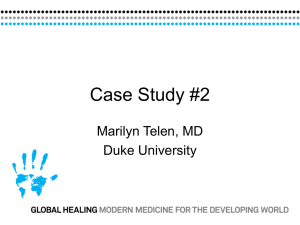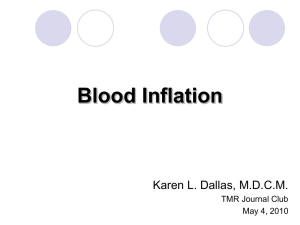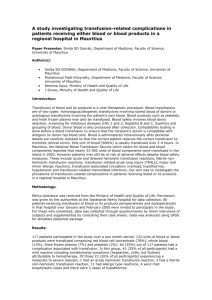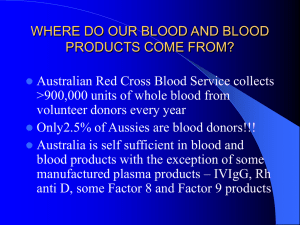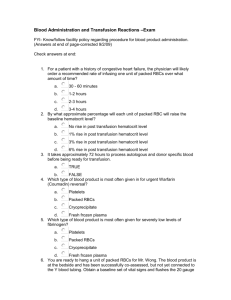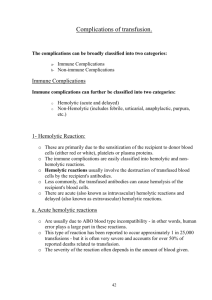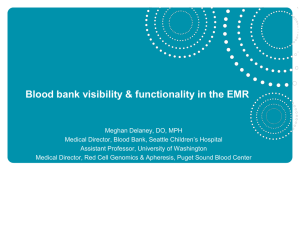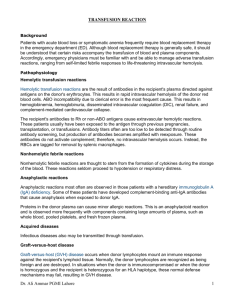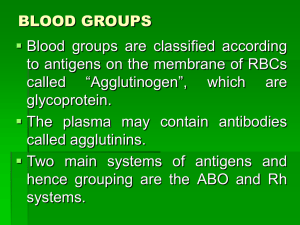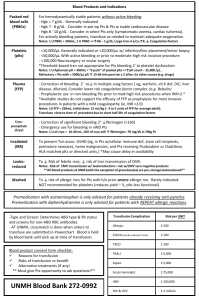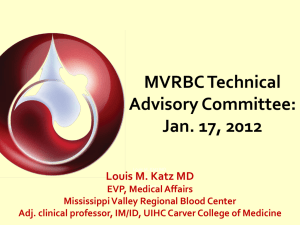Transfusion Emergencies
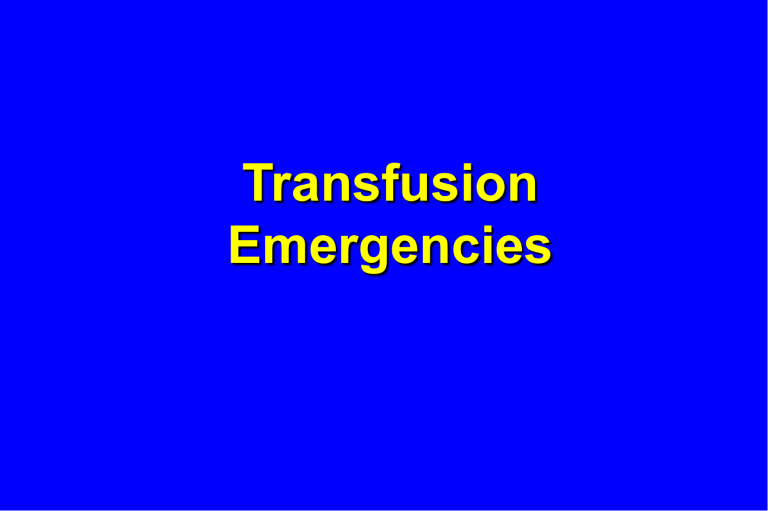
Transfusion
Emergencies
TRANSFUSION REACTIONS
• IMMUNOLOGIC
• NON-IMMUNOLOGIC
IMMUNOLOGIC TRANSFUSION REACTIONS
•
Hemolytic reactions due to RBC incompatibility
•
Febrile & pulmonary rxs due to WBC or plt Ags
•
Allergic & anaphylactic rxs due to Abs against soluble Ags, usually plasma proteins
•
Graft-vs-host dz due to transfused lymphocytes
•
Post-transfusion purpura
NON-IMMUNE TRANSFUSION REACTIONS
• Volume overload
• Metabolic - Hyperkalemia, Hypocalcemia
• Hypothermia, especially in elderly, neonates
• Coagulopathy due to dilutional effects
• Rx to contaminating infectious agents
HEMOLYTIC TRANSFUSION
REACTIONS
• Immediate intravascular hemolytic Tx reactions
• Delayed hemolytic transfusion reactions
INTRAVASCULAR HEMOLYTIC TX RXS
• Usually due to ABO incompatibility
• IgM complement-binding antibodies
• Ab to Jka, K, Fya, Rh can cause IHTR
• Lysis of transfused RBCs is usual scenario
• Rarely, lysis of recipient RBCx due to Tx of plasma containing antibodies (anti-A1)
Signs & Symptoms of IHTR
• Abrupt onset
• Fever with or without chills
• Chest or back pain
• Anxiety and Dyspnea
• Tachycardia and hypotension shock
• Intravascular coagulation
• Hemoglobinuria & Acute Renal Failure
If you suspect IHTR :
•
IMMEDIATELY stop the transfusion
• IHTR severity related to volume of RBCs given
• 30 ml of incompatible RBCs may be lethal
• Most severe IHTR caused by > 200 ml RBCs
• Mortality rate for severe IHTR is 40%
Management of IHTR
• Notify BB, send blood bag & pt blood samples
• Hydration- maintain BP, urine flow@ 100ml/hr
• Furosemide or mannitol to maintain urine flow
• Assess & treat for coagulopathy
• Monitor renal function
Delayed Hemolytic Transfusion Rx
• Usually milder than IHTR
• Predominantly extravascular hemolysis
• Occurs 2-10 days post-transfusion
• Major causes: Abs to Jka, Rh (E, c, D)
• Less commonly, Abs to K, Fya
• 10-25 % pts have > allo-antibody
Management of Delayed HTR
• Notify BB, send requested blood samples
• Maintain hydration
• Once Ab is known, pt needs card identifying the presence of the specific allo-antibody
Signs & Symtoms of Delayed HTR
• Fever
• Abrupt drop in hemoglobin
• Jaundice
• Can have hemoglobinuria & hemoglobinemia
Febrile, non-hemolytic Tx Rxs
• More common in multiply transfused pts
• Occurs in 0.5% - 3% of transfusions
• Due to Alloimmunization to WBC & plt Ags
• Can be due to cytokines (usually develop in platelet concentrates, in-vitro)
• Can be due to Tx of bacteria, bacterial toxins
Signs & Symtoms - Febrile Tx Rxs
• Chill, followed by fever, during or soon after Tx
• Headache
• Malaise
• Sometimes, with urticaria
• Usually mild
• Resolve within a few hours
Management of Febrile Tx Rxs
• Stop the transfusion
• Notify BB & send requested samples
• Consider the possibility of a hemolytic tx rx
• Evaluate for sepsis
• Meperidine for rigors, acetaminophen & HC
• Antihistamines, if urticaria
• Prevention - leukopoor blood after 2 febrile tx rx
Transfusion-Related
Acute Lung Injury
• Acute onset respiratory distress
• Due to Tx of plasma with Abs against recipient granulocyte-specific or HLA Ags
• Agglutination of granulocytes & complement activation in lung vasculature
• Capillary leak syndrome, resembles ARDS
• Occurs 1 in 5000 transfusions
Transfusion-Related Lung Injury
• Occurs within a few hours of transfusion
• Chills, fever, chest pain, sometimes hypotension
• CXR shows florid pulmonary edema
• Subsides in 48-96 hours, with supportive care
• Respiratory support for hypoxia ( O2, ventilator)
• High doses of corticosteroids can be helpful
• Hemodynamic monitoring may be needed
Allergic Reactions to Plasma
• Occurs in 1-3% of transfusions
• Mild urticaria, other types of rash
• Can see bronchospasm, angioedema
• Anaphylaxis - very rare
• Related to dose of plasma infused
• anti-IgA in IgA-deficient pts (1/400-1/500 nl people are IgA def, 20-25% have a-IgA)
Post-Transfusion Purpura
• Severe thrombocytopenia 5-10 days post-Tx
• Alloantibodies against plt-specific antigens
• Usually anti-HPA-1a
• Occurs in pts sensitized by prior Tx, pregnancy
• Rx with IVIG, Plasma Exchange, Steroids
